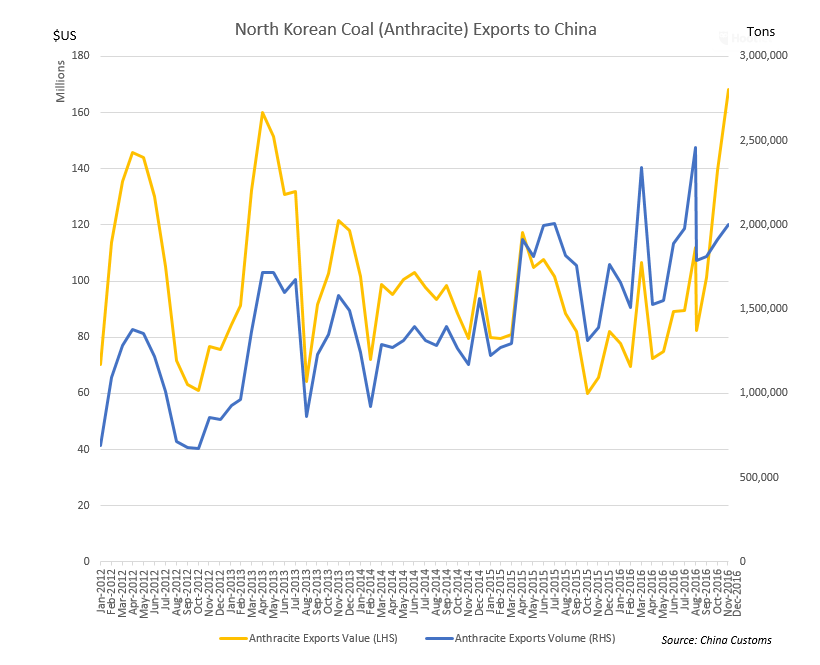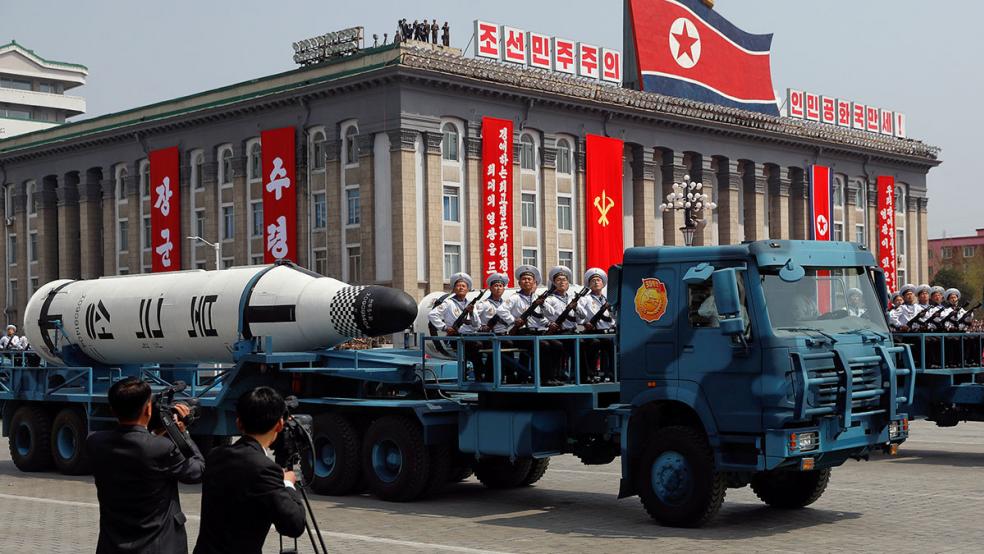The government of the Democratic People’s Republic of Korea is so secretive about the country’s economy that there is relatively little public available information about its output, the composition of its workforce, or how the government gets and spends its money. Normally informative publications, like the Central Intelligence Agency’s World Fact Book, or the World Bank’s open data bank offer more entries that read “N/A” than contain actual data when it comes to the Hermit Kingdom.
In 2014, the DPRK’s gross domestic product was estimated at about $40 billion -- roughly equivalent to the state of Wyoming. Its GDP per capita was about $1,800 per year, one of the lowest figures in the world.
Related: Trump and Xi Play Good Cop-Bad Cop with North Korea
Nevertheless, the country still maintains a very large military and is still building extremely expensive nuclear weapons and long-range delivery devices. With its military threatening another nuclear test, and its public acknowledgment that its long-term goal is to be able to deliver a nuclear weapon to the United States, the question of where the regime of Kim Jong-un gets its money is one of intense international interest.
The short answer: China. But the real story is somewhat more complicated.
After years of bellicosity and continued research and development of nuclear weapons, the North Korean government has been weighed down by sanctions that make it very difficult for Pyongyang to do much business with the West. (And, as a centrally planned economy, doing business with any entity in North Korea outside the black market is essentially equivalent to doing business with the Kim regime.)
One of the only lifelines the country possesses is the flow of trade across the border with China. Rough estimates are that China accounts for 80 percent of North Korea’s exports, and about one-third of that comes from coal.
Related: The US Plan to Neutralize North Korea Doesn’t Involve the Military
For its part, China has at least two good reasons to want to keep some or all of that trade flowing. First, it views North Korea as a buffer between its border and the US-allied South Korea.
Second, North Korea is prone to famine. In the 1990s, an untold number of North Koreans starved to death, and malnutrition remains widespread. If trade were cut off, it might not be long before China found itself dealing with a flow of starving refugees trying to cross the border.
An estimated 41 percent of the DPRK economy was dedicated to industry in 2016, according to estimates, with weapons production, heavy machinery, power production and mining among its largest sectors. Some 34 percent of the economy is in the service industry, and another 25 percent is dedicated to an agricultural sector that does not produce sufficient food to feed the country’s people.

There are other, darker elements that contribute to the cash flow the Kim government depends on. There are multiple documented cases of North Korean workers being sent abroad to work on large construction projects, particularly in the Middle East and Europe. The government in Pyongyang serves as the middleman in the transaction and is believed to pocket most of the money that the workers earn. Human rights advocates have denounced the practice as tantamount to slavery.
Related: Trump’s ‘Tough Guy’ Foreign Policy Falls Flat with Russia and China
The North Korean government is also believed to have set up a network of front companies throughout Asia that appear independent but secretly operate for the benefit of the government, helping Pyongyang to avoid the international web of sanctions meant to isolate it from the global economy.
Kim’s regime also sponsors a small army of computer hackers, believed to be affiliated with the military, who have been able to steal many tens of millions of dollars, in large part by attacking banks with inadequate security systems.
However, even if the international community could close off all of the illicit means by which North Korea takes in money, the ultimate goal of shutting down funding to the country’s nuclear program would still require China’s cooperation.
Analysts believe that the North Korean regime has substantial cash reserves in China from years in which the price of coal was high, and Pyongyang elected not to use profits from its sales to benefit the DPRK economy. That money, so long as the regime maintains access to it, can be used to fund the nuclear program even in the face of increased international sanctions.
Related: Who Is That Man in the Oval Office, and What Has He Done with President Trump?
The Kim family has a long history of placing its survival over the good of the North Korean people, so if trade kept flowing across the Chinese border and the government retained access to its currency reserves in China, North Korea would likely remain at least functional enough to continue pursuing its nuclear ambitions, even if it meant people starving again.
The international community as a whole has the ability to punish the North Korean people if it so chooses. But if the goal is to shut down the DPRK nuclear program through sanctions, the only road to success leads through Beijing.





